
 Some other area animal rescues stepped up to work with us. Fancy Cats collected pet food donations and HART volunteer Kerry Kieger and crew helped at our trucks.
Some other area animal rescues stepped up to work with us. Fancy Cats collected pet food donations and HART volunteer Kerry Kieger and crew helped at our trucks.
We put out a plea for donations and the response was overwhelming. Avalon Consulting provided pet food donations as well as monetary donations for us to buy supplies to take down to the hurricane relief area. Clarus Merchant Services was very generous to provide donations allowing us to rent two trucks for all the supplies we collected and cover expenses there and back. HSLC donors also stepped up to provide funds for us to buy supplies for the hurricane victims.
We contacted Spanky’s Shenanigans in Leesburg for some advice because they helped with Hurricane Harvey last year. 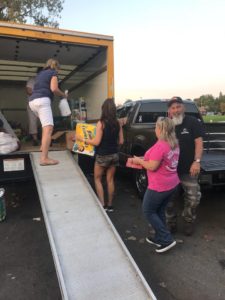 They immediately offered to help us “stuff a truck” at their weekly Wednesday Yappy Hour. Thank you to owner Azmi, servers Katie & Joanie, and all their wonderful friends and patrons (both two and four legged) who helped. Just a few doors down, our friend Darla at the Leesburg Petsmart worked to collect a large pallet of pet food donations, personally delivering them to Spanky’s.
They immediately offered to help us “stuff a truck” at their weekly Wednesday Yappy Hour. Thank you to owner Azmi, servers Katie & Joanie, and all their wonderful friends and patrons (both two and four legged) who helped. Just a few doors down, our friend Darla at the Leesburg Petsmart worked to collect a large pallet of pet food donations, personally delivering them to Spanky’s.
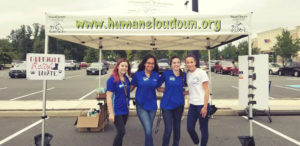 Our “stuff a truck” efforts didn’t end at Spanky’s. We obtained permission from the Dulles Landing Petsmart in Chantilly to park our truck at their store to continue collecting donations from Friday to Sunday. Thank you to managers Corey, Andrew, and Lauren. Coal Fire Pizza manager Alexandra ran into us in the parking lot and set up a fundraiser at their restaurant to help with the cause.
Our “stuff a truck” efforts didn’t end at Spanky’s. We obtained permission from the Dulles Landing Petsmart in Chantilly to park our truck at their store to continue collecting donations from Friday to Sunday. Thank you to managers Corey, Andrew, and Lauren. Coal Fire Pizza manager Alexandra ran into us in the parking lot and set up a fundraiser at their restaurant to help with the cause.
HSLC was already scheduled to attend the “Caturday” event at Gum Springs Library on Saturday Sept 22nd so we arranged to have the donation truck in their parking lot that day. Thank you to Jessica Moore and team!
On the evening of Sunday September 23rd Jennifer, Katie, and Kyle set out to deliver our relief supplies to NC. After navigating though the hurricane devastated areas, their first stop was at A Dogs Dream in New Bern. This was one of the harder hit areas. A Dogs Dream is a boarding and grooming facility which opened up their doorsto receive donations and continued to be a distribution point during the coming weeks.
Watch this video of Jennifer and team at A Dogs Dream.
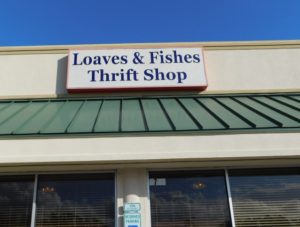 The next stop for our intrepid wanderers was to Loaves and Fishes in Beaufort, a ministry pantry that acted as a distribution center for the pets and people of Beaufort in need of supplies. It’s ran alongside local churches there. Craven Pamlico Animal Services Center received donations as well. Both of these facilities continued to get the call to help for weeks to come.
The next stop for our intrepid wanderers was to Loaves and Fishes in Beaufort, a ministry pantry that acted as a distribution center for the pets and people of Beaufort in need of supplies. It’s ran alongside local churches there. Craven Pamlico Animal Services Center received donations as well. Both of these facilities continued to get the call to help for weeks to come.
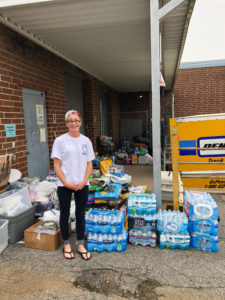 Then it was on to Cause for Paws in Raleigh, our point of contact for finding out where the supplies were needed. They were one of the rescues who helped the over 200 animals at the Raleigh fairgrounds and continued to help flood victims in the continued weeks.
Then it was on to Cause for Paws in Raleigh, our point of contact for finding out where the supplies were needed. They were one of the rescues who helped the over 200 animals at the Raleigh fairgrounds and continued to help flood victims in the continued weeks.
Thank you to all the HSLC volunteers who helped to make this happen: Melissa, Anne, Molly, Christina, Kerry, Theresa, Juanita, Sharon, Julia, Melanie, Katie, and Kyle. And, of course, a big thank-you to Jennifer.
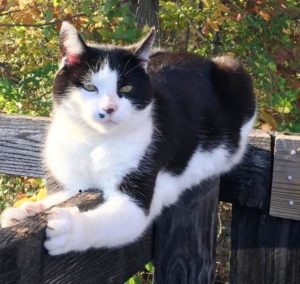
Humane Loudoun’s “Critter Control” program is a form of organic pest control that can help keep rodents away from grain, food storage, etc. They are a cleaner, more effective alternative than dangerous pesticides and they are on duty 24/7. The adopting local businesses will enjoy their company from afar as well as having the satisfaction of giving them a much-needed home. If you currently have unspayed barn cats, you can also receive assistance in having them sterilized.
Humane Society of Loudoun County is an all-volunteer, no-kill, registered non-profit 501(c)(3) organization. If you own or manage property like those previously mentioned, and have permission for long-term placement of animals on the property, please contact the Humane Society of Loudoun County at helpanimals@humaneloudoun.org. For more information visit our website.

All it takes for a pet to go hungry or be surrendered to a shelter is for their family to have an unexpected medical bill or a job loss. Therefore, in 2013, The Humane Society of Loudoun County (HSLC), Loudoun County Animal Services, and Loudoun Hunger Relief created the Loudoun Pet Pantry to help keep pets in their furever homes by providing food supplies to people in need.
And, the need is growing. Recently, HSLC doubled its food deliveries to better meet the increasing demand. So, we are in constant need of pet food donations.
As a result, we are hoping that compassionate folks across the community will help out by conducting their own pet food drives. You’ll find helpful ideas for getting started on our website.
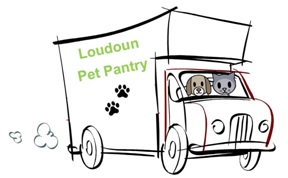 No time for a food drive? Please consider dropping off a bag or two of dog or cat food at the many donation box locations across the county. Dry food must be unopened, unexpired, non-prescription adult food; we cannot use kitten, puppy, or senior food for the pet pantry. Because space is limited, we can only use bags of dry food between 4 and 8 pounds. However, we can use all sizes of canned food.
No time for a food drive? Please consider dropping off a bag or two of dog or cat food at the many donation box locations across the county. Dry food must be unopened, unexpired, non-prescription adult food; we cannot use kitten, puppy, or senior food for the pet pantry. Because space is limited, we can only use bags of dry food between 4 and 8 pounds. However, we can use all sizes of canned food.
We also appreciate monetary donations as they allow us to fulfill any specific needs. And, if you donate through our website, please specify “Pet Pantry” in the dedication field.
Lastly, HSLC is looking for a new, donated or discounted, climate-controlled space for the growing Pet Pantry. Please contact helpanimals@humaneloudoun.org with any suggestions.
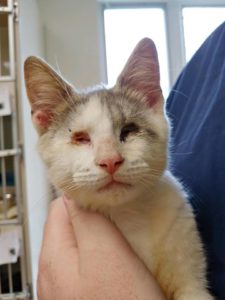
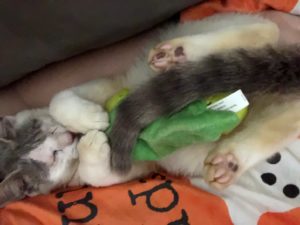
Playtime (see video below)
Imagine being dumped on a country road to fend for yourself in unfamiliar surroundings.
Now, imagine you’re a 3-month old kitten who is totally blind. What are your odds of survival?
And so begins the story of Daredevil, an incredibly sweet and trusting kitten abandoned and left to die – just because he couldn’t see. Fortunately, a friend of a Humane Society of Loudoun County (HSLC) volunteer found Daredevil and he is now safe and sound with us.
His nonstop purring and fondness for snuggling tells us that he is grateful to be alive and in such caring hands—perhaps for the first time in his young life.
Daredevil isn’t going to see again and his ruptured eyes have already been surgically removed. Currently, he is being fostered by a caring vet assistant who works at Towne Animal Clinic.
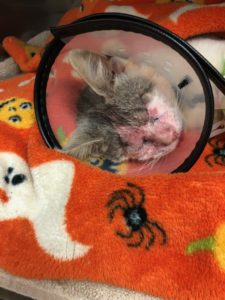
Resting after surgery
It takes a village to save a kitten’s life. From the volunteers who rescue them from unthinkable situations to the foster parents who give them a loving home to the donors who help cover their various medical expenses. But, it’s all worth it when we can give a beautiful animal like Daredevil the happy ending he deserves.
Daredevil is looking for his forever home. Check out his video below and see if you can resist this adorable love-muffin!

Christina and her husband picked Sophie up on a sunny day in June from Towne Animal Clinic in Leesburg. She was super excited to see them and couldn’t stop wagging her tail. Sophie crashed out on their couch for the first couple of days then started to play with their dog, Max, and chew bones. She was super happy to sleep in the bed, cuddle, and give kisses. 
A couple of days after Christina began fostering Sophie, we found out Sophie tested positive for Lyme, roundworms, and hookworms. She was immediately put on medications to help with these issues. But Sophie started to have a tough time getting around after about a week on the medications. One morning, she couldn’t even get out of her dog bed to go potty outside. They immediately took her to Towne Animal Clinic where her medications were changed and they decided to keep her for a couple days. Sophie improved slowly but was very tired. After a couple weeks, she bounced back and was back to her normal, loving self. She again enjoyed going on long walks, binge watching Netflix, helping with dinner prep (i.e., eating extra food), and exploring in the woods.

When Sophie met her first potential adoption family, she knew it was meant to be. The family had two dogs – Buddha and George. Buddha and Sophie got along swimmingly on their first walk and she was okay with George, too. Sophie immediately took to their backyard, sniffing everywhere and trying to mow the grass with her teeth. After the second and third visits, both Sophie and her new parents knew it was a match. Sophie absolutely loves her new home and her two new adopted brothers. As foster parents, Christina and her husband miss her dearly, but are so happy she has found her forever home! 
You too can help dogs like Sophie by becoming a HSLC foster or adopting. For fostering information and/or to apply, visit FOSTERS NEEDED or email helpanimals@humaneloudoun.org. To view our adoptable animals visit our ADOPT page.

One of our intrepid fosters, Andi Apple-Robey, did just that. Eight little black kittens were rescued from a postal facility in Sterling in April. There were two litters, one about 7 weeks old and another 5 or 6 weeks old.
The “Clue” kittens are named after the characters from the board game, Clue. Andi used colored collars to tell the kittens apart and she started calling them by those colors. Clue is a murder mystery board game with suspects that have names like Colonel Mustard, Miss Scarlet, Professor Plum, etc., so it just seemed appropriate. Boddy is the name of the victim and Wadsworth is the butler.
Recently Andi had to handle some medical emergencies with kittens Mr. Peacock, Professor Plum, and Wadsworth.
The Humane Society of Loudoun County (HSLC) is dedicated to caring for all our animals as if they were our personal pets. This means providing the funds for whatever medical procedures are needed, sometimes causing budget overruns. But the safety and well-being of our animals are always our priority.
Here is how Andi explains what happened…
“About an hour after I brought the first of the kittens to be neutered (Messrs Peacock, Green and Boddy) home from Towne Animal Clinic, I was relaxing with some water and a snack of trail mix. Mr. Peacock stressed his incision, and was bleeding heavily (all over my kitchen!), so I immediately took him back to Towne. They fixed him right up, and when I got him home, I found Wadsworth and Plum with their faces in the now empty bowl that had held my trail mix! Since the trail mix had both raisins and chocolate in it, I had to immediately gather them up and go back to the vet with them! They tried to purge them, but the boys were stubborn and refused to vomit, and so they were transferred to The Life Center (TLC) ER for three days of IV fluids to try to flush their systems and prevent kidney damage (from the raisins, they weren’t as worried about the chocolate).
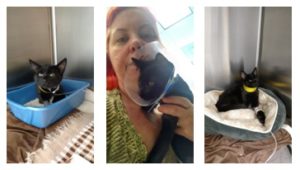
Since their blood work stayed stable during their time at TLC, Wadsworth and Plum were transferred BACK to Towne after just two days for Towne to perform their scheduled neuters and the third day of their IV fluid therapy. Once they were transferred and TLC was cleaning their cages, it was discovered Wadsworth likely had eaten part of his IV catheter. So not only did Towne have to finish his fluid therapy and perform his neuter, they had to X-ray him to see if he HAD eaten some of the hard plastic parts. Fortunately they didn’t find anything.”
We’re happy to report that the kittens are now healthy and happy. Only Mr Green is left waiting for his forever home.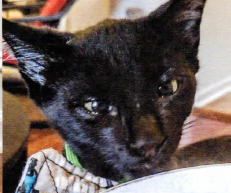
Mr. Green is our adorable crossed eyed kitten. This challenges his eyesight but not his personality. He is a committed lap-cat and bed-time snuggler, with a little bit of a food thief thrown into the mix. He’ll sneak a piece of broccoli off your plate given half a chance! It’s a good thing he’s cute about it. Learn more on our adoption page.

Usually the adult cats get overlooked at adoption events when they are competing with so many kittens . 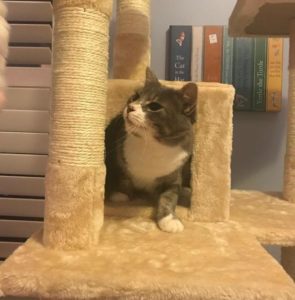
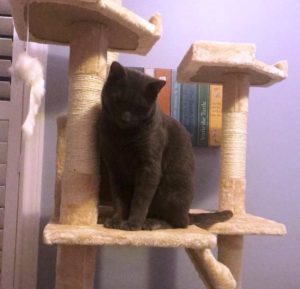 But two adult cats, Rigley and Quill, were adopted together that day! They now live in a big house with kids to play with and two small dogs to “boss around”.
But two adult cats, Rigley and Quill, were adopted together that day! They now live in a big house with kids to play with and two small dogs to “boss around”.
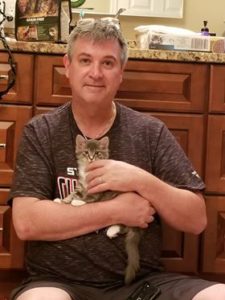 At the same event, three of our kittens found a home together (Turbo, Chopper, and Milo). We encourage adopters to consider adopting kittens in pairs so the animals have companionship and can play together instead of getting into mischief. Three together is even better!
At the same event, three of our kittens found a home together (Turbo, Chopper, and Milo). We encourage adopters to consider adopting kittens in pairs so the animals have companionship and can play together instead of getting into mischief. Three together is even better!
“All three are doing well and playing nicely. They are all so loving and social, beyond our expectation”, reported adopter Margo. “To say these boys are being spoiled with love and attention is an understatement. After a long evening of play and exploration, the three climbed in human beds.”
Watch Turbo, Chopper, and Milo play at their new home:
Interested in adopting or know someone who is? Please visit our calendar for our next adoption event.

Thank you to everyone who completed our Pet Owner Survey earlier this summer. The results were doggone interesting!
Here are some fun findings:
• 69% of you have two or more pets and 71% of you have been pet owners for 16 years or more! Companionship is—by far—the number one reason you brought a pet into your home.
• Dog people (65%) outnumber cat people (63%) but only by a nose! And, let’s not forget about the folks with birds (2%), fish (4%), rabbits (4%) and other pets (10%).
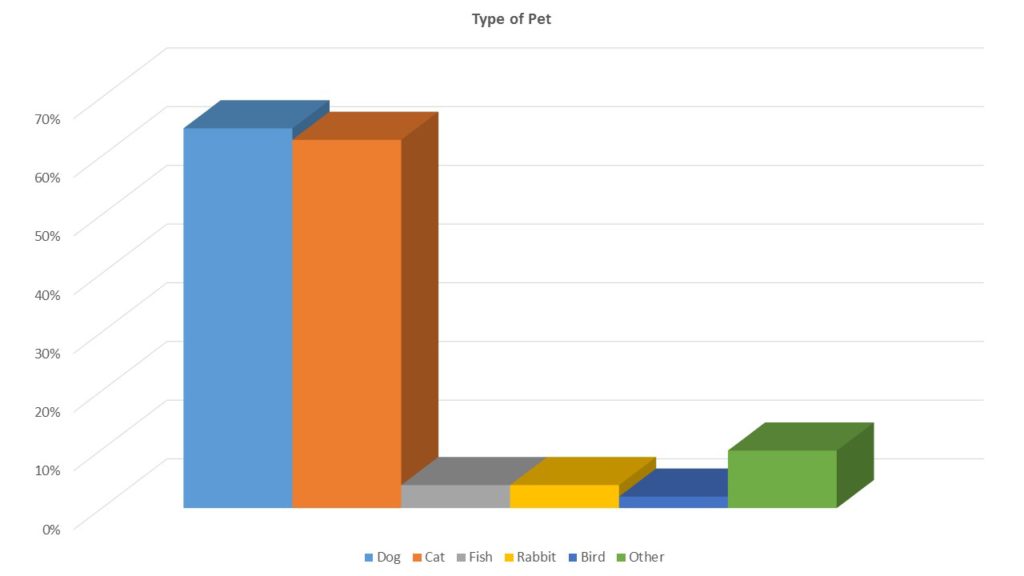
• Only 29% of you leave the TV or other entertainment on for your pets, but a whopping 100% of you talk to them. Over two-thirds of you take photos or videos of your pets.
• Most pets sleep in or on a bed – either their own or a human bed. Only 8% of pets sleep outside.
• Two-thirds of you met your pet through an adoption event or at a rescue center. You considered a variety of factors when choosing a pet:
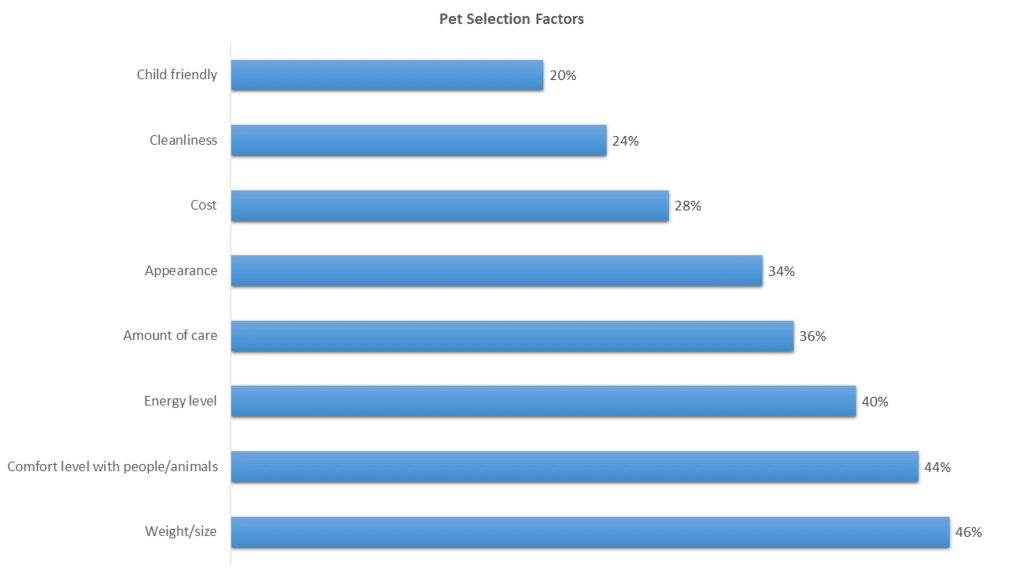
If you are thinking about adopting an animal, please visit our website to learn more about the many animals looking for their forever homes.

The Humane Society of Loudoun County (HSLC) is pleased to announce the appointment of Neal Donahue as Treasurer and Anne Senft to our Board of Directors. The two newest members of the board will support HSLC in its mission to partner with the Loudoun community to save as many animals as possible.
Neal Donahue, newly appointed Treasurer, obtained a bachelor’s degree in Accounting and a master’s degree in Business Administration from Indiana University of Pennsylvania. He previously was a member of the non-profit team of a large regional accounting firm and also spent 14 years as the CFO of a non-profit. He is currently the Partner in Charge of Business Clients for Crowe Donahue PLLC, a public accounting firm in Ashburn, Virginia.
“It resonated with my wife and I that the two dogs we adopted during our 33 years of marriage have been the most loving and thankful animals we’ve encountered,” Mr. Donahue says. “That alone made it important for me to be a part of the Humane Society of Loudoun County.” He and his wife Lynn have resided in Ashburn since 1995 where they raised their two sons and currently reside with their two Australian Cattle dogs, Riley and Gauge.
New Officer Anne Senft began volunteering with HSLC in 2017, helping with online and direct mail fundraising campaigns. She has worked for Avalon Consulting since 2015 and has 24 years of direct response industry experience. Prior to Avalon, she spent 12 years with the National Wildlife Federation (NWF) in several capacities, including Vice President of Philanthropy.
Regarding her volunteer work with HSLC, Ms. Senft says, “The significant impact this all-volunteer organization has made in the Loudoun community reminds me of one of my favorite quotes from Margaret Mead: ‘Never doubt that a small group of thoughtful, committed citizens can change the world; indeed, it’s the only thing that ever has.’ I want to be a part of this change.” Anne lives in Sterling, Virginia with her husband, Tom, who also volunteers for HSLC. They have two cats, Sweet Pea and Mr. Fat Cat.
“HSLC is thrilled to add two such impressive and dedicated people to our Board,” states HSLC President Juanita Easton. “We look forward to their contributions to our mission.” Terms of service for the new Board members will run for two years.
HSLC is currently seeking volunteers to fill other positions on the Board, including one for a veterinarian and one for an attorney. HSLC also welcomes volunteers seeking to make a difference for animals through the variety of programs offered. More information about opportunities to volunteer is available on the HSLC website.

Her foster came to know her as a goofy, loving dog. Just look at some of these pictures! We worked with Annie to help her with some of her issues but we can’t change her nature. It came down to finding a family that understands her personality and loves her because of it. After months and months of meet and greets, inquires going nowhere, and working with her to help her be more social with dogs, the perfect family finally came along.

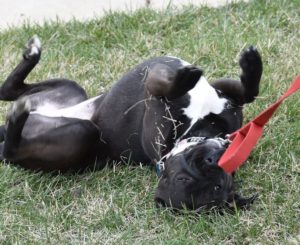

Annie now has a great life in Leesburg with a family that loves her and understands her limitations. Isn’t that what we all need?
